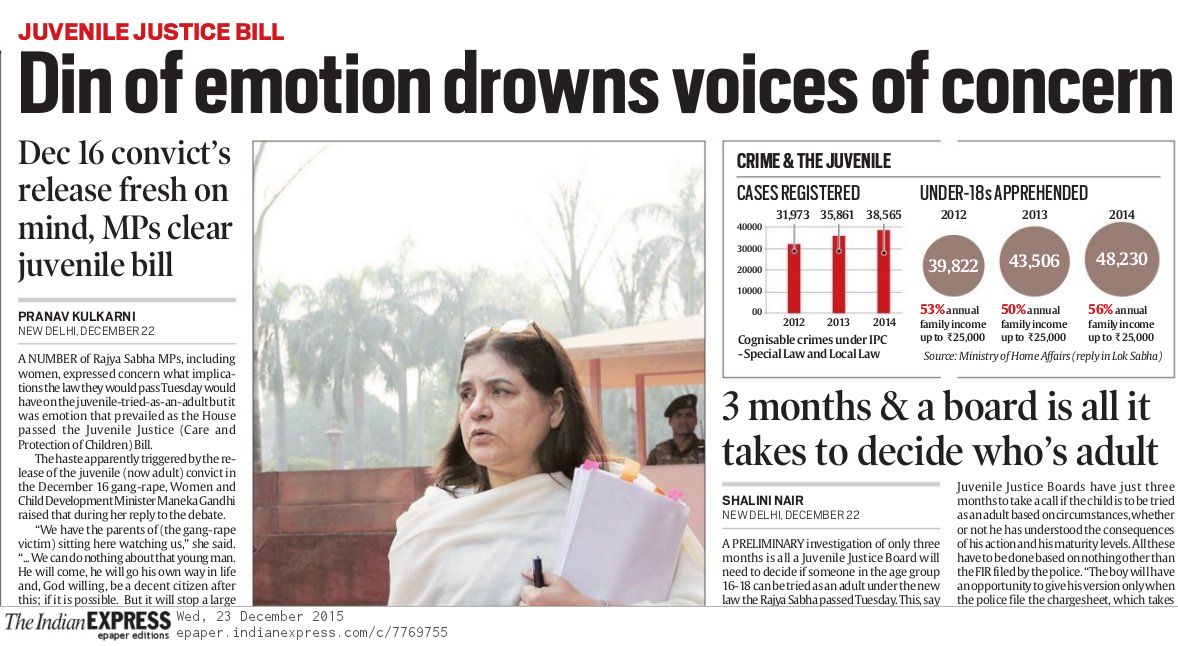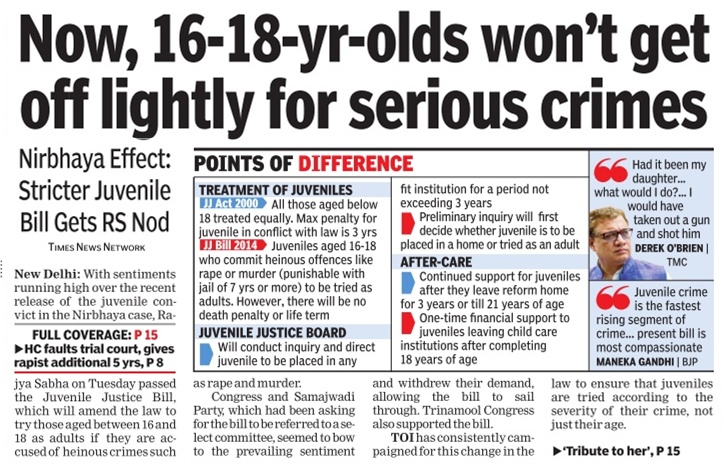The legislation was earlier cleared by Lok Sabha in May but was awaiting clearance from the Rajya Sabha. Women and Child Minister Maneka Gandhi claimed that the bill was a “nuanced” one and called upon all parties to support it. She cited statistics to assert that crimes by juveniles is on the rise, even though the government's own data contradicts this claim.
Even though the new law won’t be applied retrospectively to the 2012 Nirbhaya case, the excessive media glare around the case and the juvenile convict’s release had been drummed up into such a din that, as the Indian Express reported, even the Congress and the Trinamool Congress that had opposed the bill in Lok Sabha ended up supporting it in the upper house, "spooked by the demand on the streets" and, as one senior Rajya Sabha MP put it, “dragged along by the tide of public opinion”. While the Left parties staged a walk-out, calling for the bill to be passed on to a select committee, the Dravida Munnetra Kazhagam and the Nationalist Congress Party dissented.
As some television news channels stood behind the bill and rallied to “deliver justice”, others chided the government for not passing the bill earlier and “letting India down”.
#NirbhayaBetrayed: Nirbhaya's parents to meet @naqvimukhtar. #PassTheBill: India's faith put on test today. pic.twitter.com/VdBGMSHyNu
— NewsX (@NewsX) December 22, 2015
A screenshot from NDTV's reportage on juvenile being released
This despite commentators and child rights experts repeatedly pointing out that criminal action against juveniles of a retributive nature is not the answer and that reform and rehabilitation should be a priority. Some news channels went as far as initiating campaigns and starting petitions in their war-cry to get the bill passed to deliver “justice” to Nirbhaya, ignoring the fact that criminal laws can’t be applied retrospectively.

Times Now even termed it the "Nirbhaya Bill"

NewsX ran a change.org petition to garner support for the bill to be passed
Here's a look at how the print media reported the passing of the Bill:

The Indian Express took a shot at the two national parties in its front page headline for displaying an unusual unity in passing the bill.

The newspaper went on to report how emotions seemed to have overpowered voices of concern about the bill and its implications.

Meanwhile, the Times of India ran with a headline that announced that juveniles won’t be “let off lightly” for serious crimes.

Curiously, the newspaper’s Ahmedabad edition had a slightly different headline for the same story.

The Telegraph from Kolkata took a stronger position and called out the rush and aggressiveness displayed in the Parliament yesterday to pass the bill, using a pun:

The newspaper also highlighted the issues related to the differentiation between the law and the idea of justice pushed forward by public opinion in an editorial.

The Economic Times meanwhile exclaimed that “the wait is over”.

On its editorial page, the newspaper further supported the bill and claimed that “clearly, the societal factors at play that enable young people to commit heinous crimes are the same as those for adults” and that this is an unpleasant fact that “can’t be ignored”.
Cartoonists have been long etching their thoughts about trying juveniles as adults for the past year or so. Here is a selection:
Parliament passes #JuvenileJusticeBill, 16 and above to be tried as adults. My #cartoon pic.twitter.com/f9ooH569P6
— MANJUL (@MANJULtoons) December 23, 2015
#cartoon @timesofindia #juvenilejustice #RajyaSabha pic.twitter.com/kyQGkDjkey
— Sandeep Adhwaryu (@CartoonistSan) December 22, 2015Juvenile rapists may be tried as adults! Metro India cartoon. pic.twitter.com/N6f92ahurM
— Satish Acharya (@satishacharya) July 16, 2014
Kanoon ke haath... #cartoon #JuvenileDebate pic.twitter.com/1IhaEOejxo
— Satish Acharya (@satishacharya) December 23, 2015
Catching ' em young. #juvenile #cartoon @hemantmorparia pic.twitter.com/XU3c5eWr5Q"
— hemant morparia (@hemantmorparia) July 16, 2014









